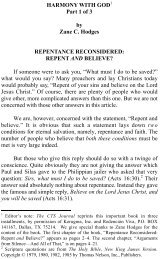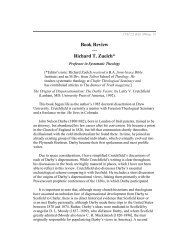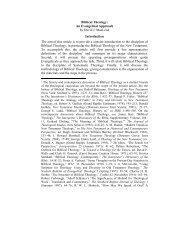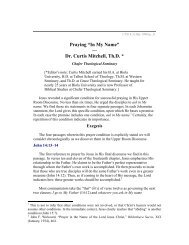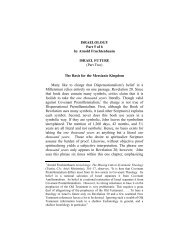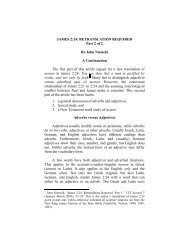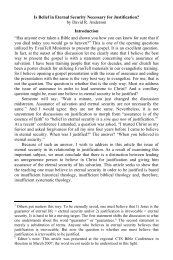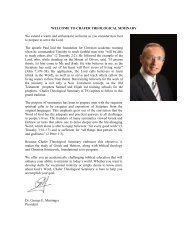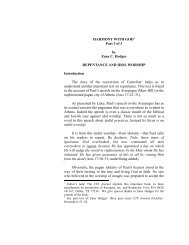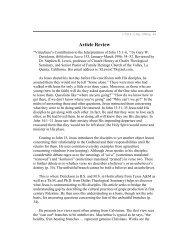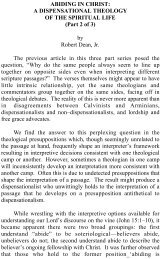Israel's Inheritance: Birthright of the Firstborn Son - Chafer ...
Israel's Inheritance: Birthright of the Firstborn Son - Chafer ...
Israel's Inheritance: Birthright of the Firstborn Son - Chafer ...
You also want an ePaper? Increase the reach of your titles
YUMPU automatically turns print PDFs into web optimized ePapers that Google loves.
84 CTS Journal 13 (Spring 2008)<br />
understood “young men <strong>of</strong> <strong>the</strong> people <strong>of</strong> Israel” to be firstborn sons, leaders <strong>of</strong><br />
<strong>the</strong>ir clans and tribes in Exodus 24:5: “He [Moses] sent young men <strong>of</strong> <strong>the</strong> people<br />
<strong>of</strong> Israel [na’arei b’nei Yisrael], who <strong>of</strong>fered burnt <strong>of</strong>ferings and sacrificed oxen<br />
as <strong>of</strong>ferings <strong>of</strong> well-being to <strong>the</strong> Lord.” The sages concluded that <strong>the</strong> firstborn<br />
sons performed sacrificial services until <strong>the</strong> construction <strong>of</strong> <strong>the</strong> tabernacle and <strong>the</strong><br />
substitution <strong>of</strong> <strong>the</strong> Levites as <strong>the</strong> priestly class. 17<br />
However, firstborn sons apparently lost this right and privilege to <strong>of</strong>fer<br />
sacrifices to <strong>the</strong> Lord because <strong>of</strong> <strong>the</strong> incident with <strong>the</strong> golden calf. Ancient<br />
commentators asked, “Who caused <strong>the</strong> firstborn to forfeit all this glory?” They<br />
gave as an explanation <strong>the</strong> worship <strong>of</strong> <strong>the</strong> golden calf and concluded that <strong>the</strong><br />
firstborn sons were “found in fetters” because <strong>the</strong>y were prohibited from <strong>of</strong>fering<br />
to <strong>the</strong> Lord anything prepared by fire, undoubtedly meaning sacrifices to <strong>the</strong><br />
Lord. 18 Ginzberg comments on <strong>the</strong> firstborn’s loss <strong>of</strong> <strong>the</strong> priestly <strong>of</strong>fice:<br />
“For God elevates no man to an <strong>of</strong>fice unless He has tried him and found<br />
him worthy <strong>of</strong> his calling.” He did not say, “and <strong>the</strong> Levites shall be<br />
Mine,” before He had tried this tribe, and found <strong>the</strong>m worthy. In Egypt<br />
none but <strong>the</strong> tribe <strong>of</strong> Levi observed <strong>the</strong> Torah and clung to <strong>the</strong> token <strong>of</strong><br />
<strong>the</strong> Abrahamic covenant, while <strong>the</strong> o<strong>the</strong>r tribes, abandoning both Torah<br />
and token <strong>of</strong> covenant, like <strong>the</strong> Egyptians, practiced idolatry. In <strong>the</strong><br />
desert, also, it was this tribe alone that did not take part in <strong>the</strong> worship <strong>of</strong><br />
<strong>the</strong> Golden Calf. Justly, <strong>the</strong>refore, did God’s choice fall upon this godly<br />
tribe, who on this day were consecrated as <strong>the</strong> servants <strong>of</strong> God and His<br />
sanctuary. 19<br />
Thus, <strong>the</strong> firstborn sons <strong>of</strong> Israel lost <strong>the</strong>ir priestly position and functions,<br />
and <strong>the</strong> Levites assumed <strong>the</strong> responsibility <strong>of</strong> <strong>of</strong>fering sacrifices to <strong>the</strong> Lord on<br />
behalf <strong>of</strong> o<strong>the</strong>rs (Numbers 3:44–45). Because <strong>the</strong> firstborn sons had lost this<br />
responsibility, <strong>the</strong> Lord instructed that <strong>the</strong> priests perform a ceremony <strong>of</strong><br />
redemption when a firstborn child was thirty days old, which consisted primarily<br />
in <strong>the</strong> payment <strong>of</strong> five shekels to a priest by <strong>the</strong> child’s fa<strong>the</strong>r. 20 This payment<br />
signified redemption from <strong>the</strong> firstborn’s responsibility <strong>of</strong> <strong>the</strong> priestly <strong>of</strong>fice,<br />
which had required him to be holy and consecrated for service to God on behalf<br />
<strong>of</strong> o<strong>the</strong>rs.<br />
earlier period. The earliest priestly responsibility <strong>of</strong> <strong>the</strong> firstborn sons is recognized in <strong>the</strong><br />
Jewish literature and occasionally in non-Jewish literature as well. See, for example,<br />
Num. Rab. 29a; cf. Num. Rab. 14b. See also Ginzberg, Legends, 211; Beitzel, “Right <strong>of</strong><br />
<strong>the</strong> <strong>Firstborn</strong>,” 180.<br />
17 Num. Rab. 29a.<br />
18 Midrash Rabbah, Numbers, 161. The midrash does not explain “anything prepared by<br />
fire,” but <strong>the</strong> priests frequently burned <strong>of</strong>ferings identified as “<strong>of</strong>ferings by fire.” See, for<br />
example, Lev. 1:9, 13; 2:2, 16; 3:3, 9, 11; Num. 15:3, 10; 28:3, 19.<br />
19 Ginzberg, Legends, 211.<br />
20 Num. 3:47; 18:16; cf. Num. Rab. 14b. Many Jews still practice this ceremony <strong>of</strong><br />
redemption today. See Isaac Klein, A Guide to Jewish Religious Practices (NY: Jewish<br />
Theological Seminary, 1979), 431–32.



